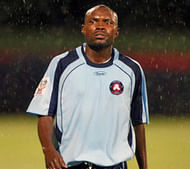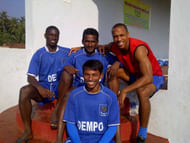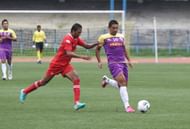Trinand & Tobago international Cornell Glen will become the seventh World Cupper to ply his trade in India as he has signed a two-year contract with Shillong Lajong. The striker featured in all three of T&T’s matches at the 2006 World Cup in Germany.
Sportskeeda lists the top five World Cuppers who have played for clubs in India.
Note: Despite some claims, Iran defender Ahmad Sanjari, who had a spell with Mohammedan Sporting in 1979 and coached Dempo in the 90s, didn’t feature for the West Asian country at any World Cup and thus is not part of this list. Sanjari did represent Iran at the 1984 Asian Cup, where they drew goalless with India in a group game.
Majid Bishkar
Considered to be one of the best foreigners to have ever played in India, Majid was part of the Iran squad at the 1978 World Cup in Argentina. Iran finished bottom of their group, picking just one point in three games with Majid being an unused substitute in each match. He then moved to India to study at the Aligarh Muslim University where he along with other Iranians were spotted by officials of Kolkata clubs. He joined East Bengal in 1979 and spent two years there, impressing everyone at the Calcutta Maidan through his pace and trickery.
The attacking midfielder had an even better spell at Mohammedan Sporting, helping them win two back-to-back Federation Cup trophies in 1983 and 1984. After a brief hiatus, he returned to Mohammedan Sporting in 1987 and was last seen playing there. The most interesting part about this Iranian was the confusion regarding his name as Indians mispronounced and misspelled him as ‘Majid Bashkar’ whereas in Iran and according to official FIFA records, his name reads as ‘Majid Bishkar’. Hence many people in Iran were later shocked to know that one of their World Cuppers had plied his trade in India and still many remain unaware of his playing career in Indian football.
Emeka Ezeugo
This Nigerian remains the only player to first have a career in India before playing the World Cup. Emeka first played for East Bengal in 1986 and two years later the central defender was representing Nigeria at the 1988 Olympics in Seoul, where the Super Eagles crashed out from the group stage after three straight defeats. In 1989, Emeka joined Mohammedan Sporting and had a very fruitful spell there. He then moved to Malaysia before playing for clubs in Denmark. He was part of Nigeria’s 1994 World Cup squad that topped their group, which contained Diego Maradona’s Argentina, and only lost after extra time to eventual runners-up Italy in the round of 16.
Emeka’s only appearance though came in Nigeria’s opening encounter against Bulgaria as he replaced the legendary Finidi George in the 77th minute. Emeka also spent one season at Churchill Brothers in 1997-98 and then built up a reputation of being a well-travelled player as he ended up playing professionally in five different continents. The defender also had a brief stint as Churchill Brothers head coach at the start of the 2008-09 season but reportedly fell out with some senior players just a few weeks after being appointed. He remains a keen follower of Indian football.
Macdonald Mukansi
The South African represented his country at the 2002 World Cup in South Korea and Japan where the Bafana Bafana narrowly missed out on qualification to the knockout stage. Mukansi’s only appearance in the tournament came as a substitute in the opener against Paraguay. The right-sided winger, who wore the number ‘9’ jersey for South Africa, came on as a substitute in the 27th minute and helped South Africa come back from two goals down to draw 2-2. South Africa were level on points with Paraguay after three games but the South Americans progressed to the next round as they netted one additional goal. Five years later, after having spells in South Africa, Cyprus and Bulgaria, Mukansi surprised everyone by joining East Bengal in India.
Nicknamed as the ‘Scooter’, due to his immense pace, Mukansi had explained his move to India as a ‘spontaneous choice’ but eventually it didn’t go according to plan. After showing flashes of brilliance initially in some friendlies and local league games, the South African failed to deliver for the red-and-gold brigade in the newly-launched I-League and soon was benched by then-coach Subroto Bhattacharya. East Bengal entered a relegation battle and by the time Subroto was replaced by Manoranjan Bhattacharya, Mukansi had been released by the Kolkata club.
Densil Theobald
The 30-year-old versatile midfielder was a key member of the Trinidad & Tobago side that qualified for the 2006 World Cup. Theobald started for T&T in all three of their games in Germany 2006, where the Caribbean nation bowed out from the group stage after registering just one point in three matches. Theobald started in central midfield against Sweden in their Group B opener, in which the CONCACAF member managed a goalless draw. He started in a left midfield role in the second game against England and T&T nearly earned another creditable point but two late goals saw the Three Lions prevail.
Theobald was substituted in both of T&T’s first two matches but completed 90 minutes in the final group game against Paraguay which his country lost 2-0. Having spent most of his career with T&T outfit Caledonia AIA, Theobald undertook a new challenge by signing for India’s record champions Dempo in October 2011. The player however was only registered in mid-January 2012 as he had to wait for the reopening of the winter window for his ITC (International Transfer Certificate) to arrive. Nonetheless, Theobald’s class and experience gave force to Dempo’s title charge in the second half of the season and the Goan club went on to lift their record fifth title.
After representing his country in the youth World Cup, Hernandez started every game in Costa Rica’s 2004 Olympic Games campaign, where the North American outfit reached the quarter-finals. The playmaker was then part of the 2006 World Cup squad in Germany but managed only substitute appearances against Ecuador and Poland with Costa Rica getting eliminated from the group stage after three straight defeats. After becoming a star in Australia’s A-League with Melbourne Victory, Hernandez joined the ambitious Prayag United project in 2012. He became one of the most expensive players in India and was expected to take the I-League by storm. After the first two games it did look like that way as he inspired the purple shirts to back-to-back wins.
But with Prayag replacing Sanjoy Sen with Eelco Schattorie as head coach, Hernandez fell out with the newly-appointed Dutchman and was show caused internally by the club for misconduct in a match in which he was substituted. Even moments of brilliance like the perfectly curled freekick against Dempo didn’t improve relations between Hernandez and Schattorie and the player miffed club officials by agreeing on a contract with Wellington Phoenix of the A-League while on leave due to his father’s death. Hernandez eventually joined the New Zealand club after the end of his contract with Prayag.




